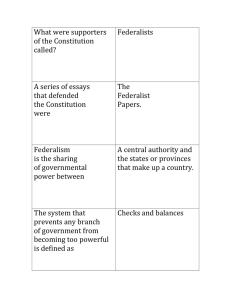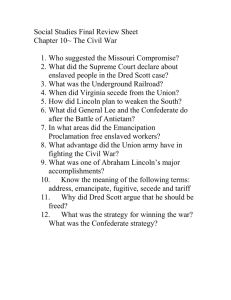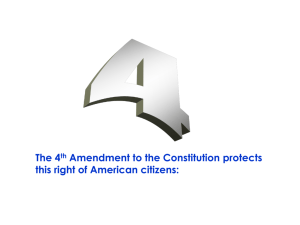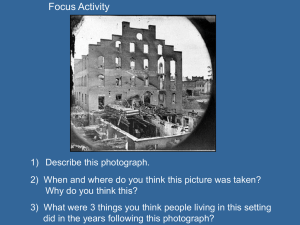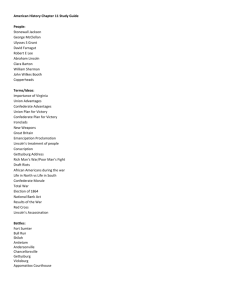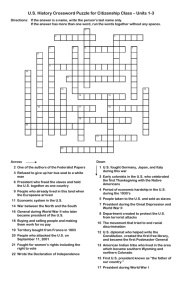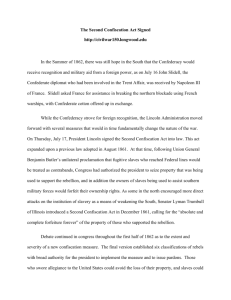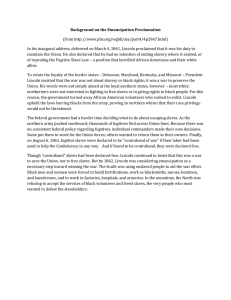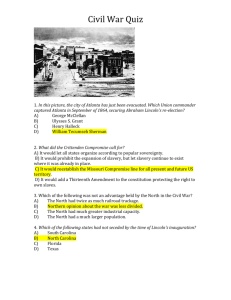The Federalist Papers
advertisement
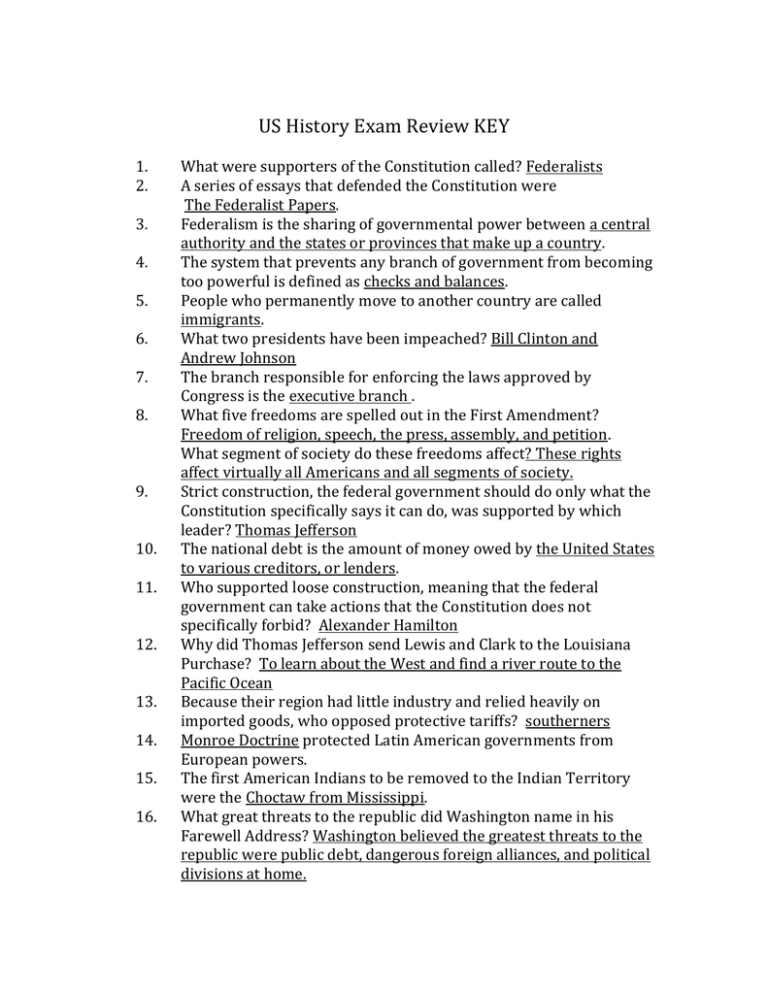
US History Exam Review KEY 1. 2. 3. 4. 5. 6. 7. 8. 9. 10. 11. 12. 13. 14. 15. 16. What were supporters of the Constitution called? Federalists A series of essays that defended the Constitution were The Federalist Papers. Federalism is the sharing of governmental power between a central authority and the states or provinces that make up a country. The system that prevents any branch of government from becoming too powerful is defined as checks and balances. People who permanently move to another country are called immigrants. What two presidents have been impeached? Bill Clinton and Andrew Johnson The branch responsible for enforcing the laws approved by Congress is the executive branch . What five freedoms are spelled out in the First Amendment? Freedom of religion, speech, the press, assembly, and petition. What segment of society do these freedoms affect? These rights affect virtually all Americans and all segments of society. Strict construction, the federal government should do only what the Constitution specifically says it can do, was supported by which leader? Thomas Jefferson The national debt is the amount of money owed by the United States to various creditors, or lenders. Who supported loose construction, meaning that the federal government can take actions that the Constitution does not specifically forbid? Alexander Hamilton Why did Thomas Jefferson send Lewis and Clark to the Louisiana Purchase? To learn about the West and find a river route to the Pacific Ocean Because their region had little industry and relied heavily on imported goods, who opposed protective tariffs? southerners Monroe Doctrine protected Latin American governments from European powers. The first American Indians to be removed to the Indian Territory were the Choctaw from Mississippi. What great threats to the republic did Washington name in his Farewell Address? Washington believed the greatest threats to the republic were public debt, dangerous foreign alliances, and political divisions at home. 17. 18. 19. 20. 21. 22. 23. 24. 25. 26. 27. 28. 29. 30. 31. 32. Compare the Federalist Party with the Democratic-Republican Party. The Federalist Party, which was most popular in New England, wanted to strengthen the power of the federal government and to promote industry and trade. The Democratic-Republican Party, which was most popular in the South and along the western frontier, wanted to limit the power of the federal government. To convince business owners to listen to them, workers sometimes staged strikes. Define strikes. Refusing to work until employers meet union demands The cotton belt extends from Virginia to Texas. Former slaves who contributed to the antislavery cause were Frederick Douglass, Sojourner Truth, and Harriet Tubman White northerners’ opposition to the abolition movement tended to center on the belief that African Americans should not receive equal treatment and that freed slaves would take jobs away from white northerners. Harriet Tubman was one of the leaders of the Underground Railroad, a network of people who arranged transportation and hiding places for fugitive slaves. In what became known as the Freeport Doctrine, Stephen Douglas upheld popular sovereignty over the power of the Supreme Court. The first state to formally withdraw from the Union was South Carolina. The Fugitive Slave Act was a part of the Compromise of 1850. After John Brown seized the federal arsenal in Harpers Ferry, he hoped slaves in the region would join him, but none did. When California applied for statehood, the majority of its residents wanted California to enter the Union as a free state. The U.S. Supreme Court ruled that Congress could not prohibit someone from taking slaves into a federal territory because slaves were considered property. Which presidential candidate opposed the spread of slavery but promised not to support abolishing it where it already existed? Abraham Lincoln Dred Scott sued for his freedom, saying that he had become free when he lived in a free territory. After hearing Dred Scott’s petition for freedom, Taney ruled that as a noncitizen, Scott did not have the right to file suit in federal court. The first major clash of Union and Confederate armies took place in July 1861 along a creek called Bull Run, near Manassas Junction, Virginia. 33. 34. 35. 36. 37. 38. 39. 40. 41. 42. 43. 44. 45. 46. 47. 48. 49. 50. 51. 52. 53. The Emancipation Proclamation was an order that called for all slaves in areas rebelling against the Union to be freed. In response to the fall of Fort Sumter, Lincoln called on state governors to provide a total of 75,000 militiamen to help put down the rebellion in the South. In early 1864, Lincoln entrusted command of the Union army in the East to Ulysses S. Grant. Lee’s attempt to launch an offensive into Union territory ended in defeat at Gettysburg. The wartime Confederate capital was Richmond, Virginia. Targeting military as well as civilian economic resources to destroy an opponent’s ability and will to fight is total war. Starving residents and Confederate soldiers resorted to eating horses, dogs, and rats during the Siege of Vicksburg. At the beginning of the war, the North’s advantages included a greater number of factories. Through cotton diplomacy, the South tried to win foreign support especially from Great Britain. The Union navy wanted to blockade the South for what reasons? cut off Southern trade and hurt the economy Among the South’s advantages at the beginning of the war were skilled military leaders. More than 3,000 women served the Union as paid nurses under the leadership of Dorothea Dix. American Indians who fought in the Battle of Pea Ridge hoped that Confederate leaders would grant the American Indian nations greater independence than the Union had. The Union gained control of the Mississippi River with the surrender of Pemberton’s forces to General Grant at Vicksburg. For most of the war, the 180,000 African American soldiers who fought with the Union received more or less pay than their white counterparts. Less Who wrote the powerful antislavery novel Uncle Tom’s Cabin? Harriet Beecher Stowe Who was the victor in the 1860 presidential race? Abraham Lincoln What is the act of formally withdrawing from the Union? succession Who was the general who developed the Union’s early war strategy? Winfield Scott Who earned the nickname “Stonewall” at the First Battle of Bull Run? Thomas Jackson The main purpose of Reconstruction was to reunite the country and to build a southern society not based on slavery. 54. 55. 56. Many white southerners referred to northern-born Republicans who came South right after the war as carpetbaggers. On January 31, 1865, at Lincoln’s urging, Congress proposed the Thirteenth Amendment, which made slavery illegal throughout the United States. Under the Fourteenth Amendment, guaranteed citizenship and equal protection under the law were not extended to American Indians.
